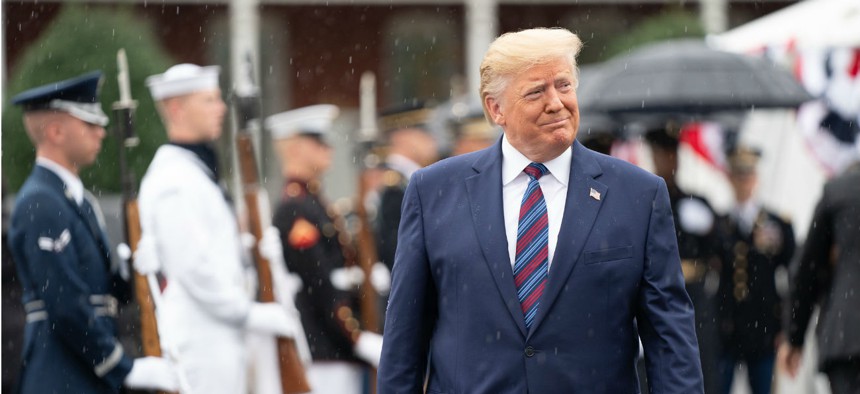
President Trump on Monday participates in an Armed Forces Welcome Ceremony in honor of the 20th Chairman of the Joint Chiefs of Staff . Official White House Photo by Shealah Craighead
Agencies May Now Enforce Trump’s Controversial Workforce Orders
An expired court injunction clears the way for the administration to significantly curtail the power of federal employee unions.
Federal agencies are now free to implement three controversial executive orders signed by President Trump in 2018 aimed at limiting the power of employee unions. A court injunction against the orders was lifted Wednesday, a week after a federal appeals court declined to rehear a case brought by the unions.
The three executive orders would shorten the length of performance improvement plans to 30 days, exempt adverse personnel actions from grievance proceedings, streamline collective bargaining negotiations, and significantly reduce the number of work hours union members can spend on official time.
Tony Reardon, national president of the National Treasury Employees Union, called it a “sad day for the employees who serve this country.”
“For the first time since our merit-based civil service was created, we now have a series of presidential fiats—directly in conflict with the law—that are designed to marginalize the voices of federal workers, weaken their due process rights, and severely limit their elected union representatives’ ability to represent them and ensure that our civil service system is based on merit, not favoritism or patronage,” Reardon said.
In August 2018, U.S. District Judge Ketanji Brown Jackson found that Trump’s executive orders, taken together, effectively “eviscerated” federal employees’ collective bargaining rights. But in July, a three-judge panel on the U.S. Court of Appeals for the D.C. Circuit overturned that ruling, which blocked agencies from implementing the orders. In overturning the lower court’s decision, the panel did not weigh in on the merits of the case, but rather ruled that federal employee unions must first seek redress through the Federal Labor Relations Authority’s administrative review process. The full court last week declined to rehear the case as the unions had sought.
NTEU and other federal unions will continue to fight the executive orders “through whatever means available,” Reardon said.
When the appeals court ruling was issued last week, American Federation of Government Employees National President J. David Cox said he was outraged by the court’s ruling.
“While we review our options, hundreds of thousands of federal government workers will suffer as their access to union representation at the worksite is stripped away by the implementation of President Trump’s union-busting executive orders,” Cox said.







